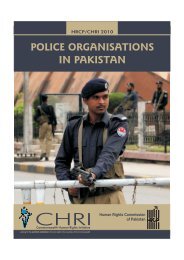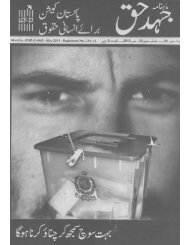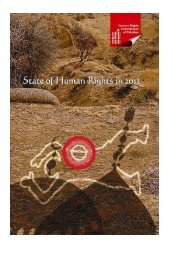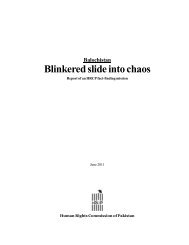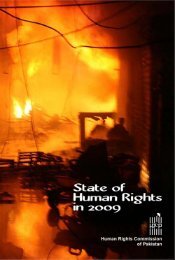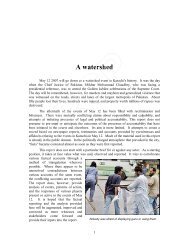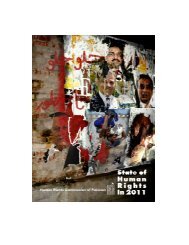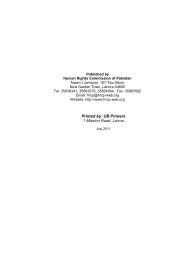Download PDF file - Human Rights Commission of Pakistan
Download PDF file - Human Rights Commission of Pakistan
Download PDF file - Human Rights Commission of Pakistan
- No tags were found...
Create successful ePaper yourself
Turn your PDF publications into a flip-book with our unique Google optimized e-Paper software.
Introduction 9direction <strong>of</strong> the Magistrate.22 Police Performance in Post Police Order Context, supra note 6.23 Comments made by I. A. Rehman (Secretary General <strong>Human</strong> <strong>Rights</strong> <strong>Commission</strong> <strong>of</strong> <strong>Pakistan</strong>) at “Police Reform in<strong>Pakistan</strong>: Beyond Analysis”, a Joint CHRI-HRCP Consultation, Lahore, 28 November 2008 attached as Annex - B withthe Police Order, 2002 (Chapter 2)24 Code <strong>of</strong> Criminal Procedure (Amendment) Ordinance, 2001 dated 13 th August, 2001 amended the Cr PC in the light <strong>of</strong> thedecision to abolish district magistrate’s <strong>of</strong>fice to devolve powers to local governments. Similarly, the Police (Amendment)Order (Chief Executive’s Order 7 <strong>of</strong> 2001) dated 13 th August, 2001 removed references to the District Magistrate andtransferred most <strong>of</strong> the powers to the police.25 The preamble envisaged the police to become an institution which would be publicly accountable, pr<strong>of</strong>essionallyefficient, democratically controlled and responsive to the needs <strong>of</strong> the community. Articles 3, 4 and 5 <strong>of</strong> the PoliceOrder, 2002 dealt exclusively with attitudes, duties and responsibilities <strong>of</strong> the police towards the public. Public oversightmechanisms were introduced at the district level by establishing public safety commissions, and Zila Nazim (a termcoined as equivalent <strong>of</strong> mayor in Urdu), elected at the district level (under the powers devolved to the local governmentsestablished in 2001), was given powers to oversee the police.26 “Since law and order issues are better dealt with at the local level, policing is therefore a provincial responsibility. Thereis a general understanding and consensus that police legislation is a provincial subject and it is at the provincial levelthat legislation on police needs to be passed”, see Jamal, supra note 18, for constitutional status <strong>of</strong> police laws at pp.8-9 and footnotes 4 to 11 at pp. 64-65. Also see International Crisis Group Asia Report No. 157, Reforming <strong>Pakistan</strong>’sPolice, 14 July 2008 at page 6.27 It may also be noted that since the local bodies completed their terms in 2010, no elections have been held by theprovincial governments. Consequently, wherever the Police Order, 2002 prescribes for representation <strong>of</strong> Zila Council,it is not being followed. For instance, one-third members <strong>of</strong> the District Public Safety <strong>Commission</strong>s are supposed to bemembers <strong>of</strong> the Zila Council. Since there are no Zila Councils, there can be no representation from local bodies. The factis that just as the federal governments have been unwilling to devolve powers to the provinces, the same wayprovinces are averse to the idea <strong>of</strong> devolution to the local bodies. Seen in this context the Constitution (EighteenthAmendment) Act, 2010 is a remarkable advancement in the direction <strong>of</strong> devolution. But how long will it take for theprovincial governments and legislatures to come around the idea <strong>of</strong> devolution to local governments? It is anybody’sguess. It is for this reason, among others, that tagging police reform with local governments was not a good idea,though it may well be argued that some <strong>of</strong> the most successful models <strong>of</strong> policing have been built around the concept<strong>of</strong> policing at or around the local level.28 For a comparative idea <strong>of</strong> the Police Order, 2002 before and after the amendments and discussion on the Order, seeFeudal Forces: Reform Delayed – Moving From Force to Service in South Asian Policing, (2008), Commonwealth<strong>Human</strong> <strong>Rights</strong> Initiative, pp. 56-74: http://www.humanrightsinitiative.org/publications/police/feudal_forces_reform_delayed_moving_from_force_to_service_in_south_asian_policing.pdf. The Police Order, 2002provided in this volume includes the original provisions as footnotes to the amended text. Also see InternationalCrisis Group Asia Report No. 157, Reforming <strong>Pakistan</strong>’s Police, 14 July 2008 at page 7 onwards.29 See Sindh High Court Bar Association versus Federation <strong>of</strong> <strong>Pakistan</strong>: PLD 2009 SC 879. The SC issued direction that allthe ordinances given protection under the Provisional (Constitution) Order, 2007 (Order No. 1) should be laid beforethe Parliament for consideration. The ordinance was laid before the National Assembly as a bill in October, 2009; seeNational Assembly <strong>of</strong> <strong>Pakistan</strong> website, “Ordinances Laid” at serial no. 39. However, it never passed through the stage<strong>of</strong> consideration by the National Assembly’s Standing Committee on the Interior. Though the Ordinance wasrepromulgated in November, 2009 by the President <strong>of</strong> <strong>Pakistan</strong> as the Police Order (Amendment) Ordinance, 2009 (XLIV<strong>of</strong> 2009) which lapsed in late March 2010, whereafter it has not been repromulgated. Section 27 <strong>of</strong> the Constitution(Eighteenth Amendment) Act, 2010 (w.e.f. 19 April 2010) prohibited repromulgation <strong>of</strong> presidential ordinances oncethey lapse at the expiry <strong>of</strong> one hundred and twenty days. Ordinances may further be extended by the NationalAssembly through resolution only once for a period <strong>of</strong> one hundred and twenty days.30 Article 9 <strong>of</strong> the Police Order, 2002.31 Under Article 33 <strong>of</strong> the Police Order, 2002, Zila Nazim may visit a police station to find out if any person is in unlawfuldetention and in appropriate cases may also direct action in accordance with law against the police <strong>of</strong>ficers responsible



